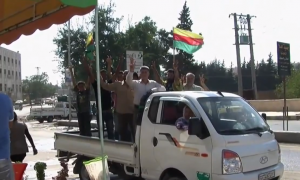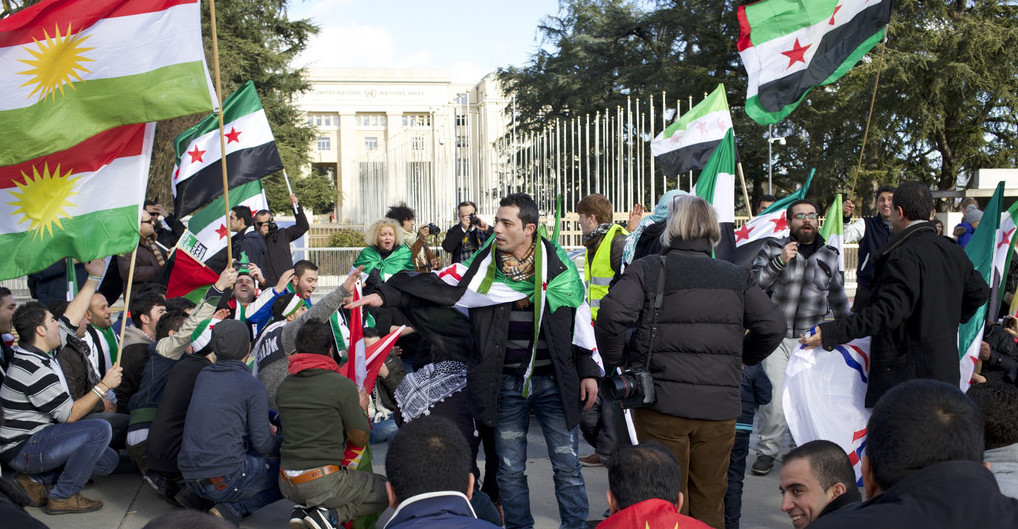As the Syrian civil war approaches its fourth year, prospects for peace are increasingly dim. Western-led negotiations have proved unfruitful. The United States has no visible strategy for ending the conflict, much less for assisting in a democratic transition. But while the armed opposition within the country is rife with extremists, Washington has been ignoring a natural and potentially valuable ally: the Kurds.
Since the uprisings against President Bashar al-Assad’s regime were sparked in Damascus, the Kurds have taken control of Syrian lands in the northeast. Constituting about 10 percent of Syria’s population, the Kurds are the largest minority group in Syria and the largest ethnic group in the Middle East without a state of their own.

In recent years, Kurds have managed to carve out a once unthinkable degree of independence in the war-torn country. The Democratic Union Party (PYD) and its affiliates announced in January the establishment of “democratic self-administration” in the three Kurdish-dominated regions: al-Jazira in the northeast, Ain al-Arab (Kobani in Kurdish) in the central sector and around Ifrin in the far northwest.
Despite the move towards autonomy, the Kurds have denied accusations that they want to pursue a path towards independent rule. “We are part of Syria, regardless of the ruling regime,” said Aldar Khalil, a senior PYD figure. Rather than fulfilling aspirations of independence, Kurdish authorities are forming an interim government while the state is under siege. In conjunction with PYD-affiliated militias such as the Popular Protection Unit (YPG) securing its territory, Kurds have successfully maintained social order in these regions; children have gone back to school, hospitals are open and the local government provides basic services. Additionally, authorities have created their own police forces, issued their own license plates and have thrown off restrictions on their language and culture that were enforced when Assad had functional control over the region.
This was no small feat: Syrian Kurdish militias are constantly defending their region from attacks from the al-Qaeda-linked Jabhat al-Nusra and the Islamic State of Iraq and the Levant (ISIL). And while some have speculated that the Kurds have maintained ties with the Assad regime, it seems that their foremost interests are self-defense from Islamist militants and the maintenance of Kurdish rights. “We may have political differences with the rest of the Syrian opposition,” said Khalil, “but our basic problem is with the groups like ISIS and al-Nusra, which are linked to al-Qaeda.”
The Kurds administer the most stable, peaceful corner of Syria and have been vocal about and willing to secure better relations with the West. And they are organized– two major Kurdish representative groups, the People’s Council of Western Kurdistan (PCWK) and the Syrian Kurdish National Council (SKNC), came to a consensus on several key issues including unified Kurdish representation at the Geneva II Conference.
The armed Kurdish People’s Defense Units (YPG) deserves recognition from the West for fighting these extremist groups. The YPG claims to have killed almost 3,000 fighters from fundamentalist groups such as al-Nusra and the Islamic State of Iraq and al-Sham, efforts that have also included notable roles for female fighters. Meanwhile, Syrian Kurdistan is the safest and most stable corner of Syria, and has been a safe haven for those fleeing violence. The Kurdish focus on defending territory from both government brutality and extremist attacks has meant that Arab, Assyrian and Chechen neighbors have been able to live relatively peacefully in these regions.
Unfortunately, Washington has not engaged the Kurds in its efforts to resolve the civil war. According to some SKNC leaders, U.S. Ambassador to Syria Robert Ford pressured Kurds to be part of the Syrian National Coalition (SNC) rather than supporting independent Kurdish participation in talks. SKNC official Ahmed Suleiman reportedly stated, “We don’t understand why Ford has such a negative attitude towards Kurdish parties.” Indeed, the Kurdish party was not invited to January’s Geneva peace conference, where representatives from Iran, Iraq, Egypt and Syria were present. The picture is further complicated by the fact that Washington ally Turkey strongly rejects any independent status for Kurds, as Turkey has a long and tumultuous history with its own Kurdish population. For Turkey and the United States, support is likely to be held back due to the PYD’s linkage to the Kurdistan Workers Party (PKK), an armed group in Turkey, which is designated as a “terrorist” group by both countries. These diverging interests between Washington and Ankara surely underscore that it is time for the international community to develop a Kurdish policy of its own.
Syrian Kurds, who share an enemy in the Assad regime (which, in 2004, stripped many Kurds of Syrian citizenship—a requirement to own land, get an education and hold government jobs), have been grossly overlooked by the United States in future plans for Syria. Under siege by both government forces and oppositions militias, the Syrian Kurdistan is in dire need of assistance, with shortages of bread, milk, baby food and medical equipment. Should the United States openly support the Kurds and provide them much-needed aid, it could develop a strategic ally and an effective approach to involvement in the ongoing strife.
After decades of ignoring Iraqi Kurds, who suffered tremendously under Saddam Hussein, Washington came to embrace them as their best allies in Iraq. Thankfully, the Iraqi Kurds were forgiving and became a great strategic asset to the United States. Supporting the Kurdish peoples is an effective way to bolster U.S. interests and local liberty at the same time. In the words of Kurdish journalist Mutlu Civiroglu, “Kurds across the world have voiced their solidarity with Syrian Kurdistan, and it is time that Washington joined them.”

Carly West, thank you for the article. If anything, we need to have the US State Dept. as well as other nations remove the Kurdish groups from the terrorism lists.
As far as that closet-case Islamist (and war criminal) leader of Turkey Erdogan is concerned, he is no NATO ally. He is no friend of freedom and democracy loving nations.
Tell Erdogan to quit bombing the Kurds.
Very nice article, would be great to read more about this and about strategies for incorporating the Kurds into the next round of negotiations.
This is a very good article that describes truely the Kurdish People situation in Syria.The kurdish people have proven themself as realiable partner in Iraq.They have promoted peace in Iraq and has become a safe haven all refuegues.The Kurdish people are the only who fight against extermists in this region and have lost a lot of lifes in fighting against the common enemy of West and USA.It is a contradict that the USA allies in the region have been proven to support extermist and Al qaeda.So it is not understandable that USA ignores the Kurdish People in Syria.It will be both the USA and West interest that they support and open doors to the Kurdish People in syria.They do not deserve this isolation.